
In the last several weeks, the Jones Act has drawn headlines over how it has shaped the U.S. and worldwide shipping industry. After almost 100 years as a part of federal law, there’s much misunderstanding as to what the law actually does.
What is it?

The Jones Act requires that all merchandise loaded at one U.S. port and unloaded at another U.S. port be transported on vessels that are:
- built in the United States;
- documented under the laws of the United States;
- owned by U.S. citizens; and
- never sold to a foreign citizen.
The Jones Act only applies to domestic U.S. trade. It has no impact on vessels transporting cargo to or from another country.
Similar laws also apply to domestic transportation of passengers, towing, dredging, salvage, and fishing.
Why does the U.S. have the Jones Act?

The Jones Act was named for its sponsor, Sen. Wesley Jones (R-Wash.) and is part of the Merchant Marine Act of 1920.
During World War I, the United States lacked the merchant vessels it needed to supply U.S. troops and support its allies. Jones noted that, before the war, shipping “could be done more cheaply by others, and so we had none.”
The U.S. government struggled to build and man enough ships to support the war effort. Jones described “hundreds of millions of dollars in higher freight rates or business losses” and millions wasted in “hasty building of ships” to meet the demand.
Jones wrote that the 1920 Merchant Marine Act was intended to “build up and maintain an adequate American merchant marine.” A strong merchant marine was viewed as necessary for future commercial growth, national defense, and ensuring worldwide peace and safety.
Most major maritime countries have laws reserving domestic trade for their own citizens. These are generally known as cabotage laws. U.S. cabotage laws, however, are some of the strictest in the world.
Can the Jones Act be waived?
Waivers of the Jones Act are possible, but rare. The Jones Act can be waived by the Secretary of the Department of Homeland Security if it is “necessary in the interest of national defense.”
Waivers are not possible simply due to lack of availability of Jones Act qualified vessels.
They have been granted to meet urgent Department of Defense domestic transportation needs, and to allow prompt response to domestic needs in the event of catastrophe, war or substantial disruption to U.S. energy supplies.
Is the Jones Act successful?

The Jones Act regulates only domestic trade. It has not resulted in a bustling internationally trading American merchant marine.
Maritime Administrator Mark Buzby, a retired Navy rear admiral, noted during a May 7 interview at the Navy League’s Sea Air Space conference that only 81 internationally trading vessels sail under a U.S. flag. Of those 81, 60 receive stipends to remain U.S. flag as part of the Maritime Security Program.
The U.S. Merchant Marine is not currently capable of meeting the demands of a sustained sealift. Buzby noted that at least 86 more tankers would be needed to move enough petroleum to sustain afloat and ashore forces in a major sealift effort.
He also said that about 1,800 more mariners would be needed to crew the Ready Reserve Fleet and Military Sealift Command vessels the U.S. already has.
U.S. flag vessels have higher operating and maintenance costs, higher taxes and more stringent requirements than foreign flag vessels. These higher costs apply to all U.S. flag vessels, both Jones Act and non-Jones Act.
Despite higher costs, the U.S. flag included nearly 20,000 inspected vessels in 2018. The vast majority of the U.S. flag consists of tug boats, barges and passenger vessels operating domestically under the Jones Act.
Echoing the same sentiments as Sen. Jones, Rear Adm. Buzby stated, “to have a Merchant Marine that’s available in time of war, they need to be around in time of peace. They have to exist.”
Suggestions for strengthening the U.S. merchant fleet have included expanding U.S. cabotage laws or providing incentives for non-Jones Act vessels to join the U.S. flag fleet.
At this point, it’s unclear what the U.S. would do if it urgently needed to meet the demands of a sustained sealift.





